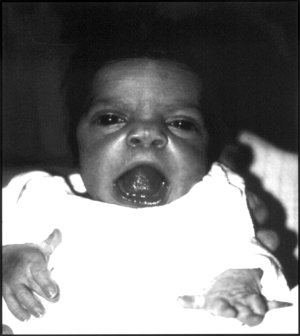Robinow Syndrome

Robinow syndrome is a rare disorder that affects the bones as well as other parts of the body. Two forms of Robinow syndrome have been described: autosomal recessive Robinow syndrome, and the milder autosomal dominant Robinow syndrome. They are distinguished based on their modes of inheritance, symptoms, and severity.
Autosomal recessive Robinow syndrome causes shortening of the long bones in the arms and legs; short fingers and toes; wedge-shaped spinal bones leading to kyphoscoliosis; fused or missing ribs; short stature; and distinctive facial features. Other features may include underdeveloped genitalia; dental problems; kidney or heart defects; or delayed development. This form is caused by mutations in the ROR2 gene.
Autosomal recessive Robinow syndrome causes shortening of the long bones in the arms and legs; short fingers and toes; wedge-shaped spinal bones leading to kyphoscoliosis; fused or missing ribs; short stature; and distinctive facial features. Other features may include underdeveloped genitalia; dental problems; kidney or heart defects; or delayed development. This form is caused by mutations in the ROR2 gene.
Autosomal dominant Robinow syndrome causes more mild, but similar, features. There are rarely spine and rib abnormalities, and short stature is less severe. A variant type of this form is additionally characterized by osteosclerosis. Autosomal dominant Robinow syndrome may be caused by a mutation in the WNT5A or DVL1 gene.
In some cases, the underlying cause of Robinow syndrome is unknown. Management may include bracing or surgery for skeletal abnormalities and growth hormone to increase growth rate in affected children.